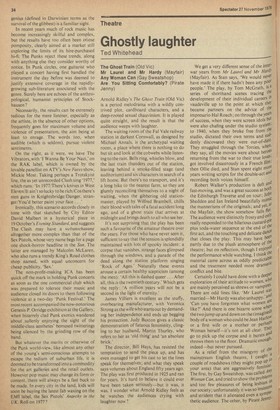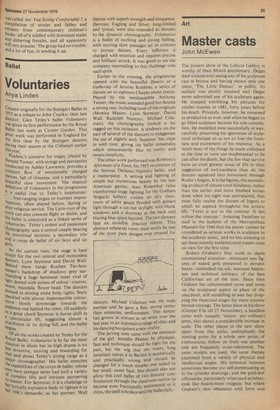Theatre
Ghostly laughter
Ted Whitehead
The Ghost Train (Old Vic) Mr Laurel and Mr Hardy (Mayfair) Any Woman Can (Gay Sweatshop) Are You Sitting Comfortably? (Pirate Jenny) Arnold Ridley's The Ghost Train (Old Vic) is a period melodrama with a wildly contrived plot, cardboard characters, and a deep-rooted sexual chauvinism. It is played quite straight, and the result is that the audience weeps with laughter.
The waiting room of the Fal Vale railway station in darkest Cornwall, as designed by Michael Annals, is the archetypal waiting room, a place where there is nothing to do but sit and look at the cobwebs while listening to the rain. Bells ring, whistles blow, and the last train thunders out of the station, leaving behind a smoke-filled stage (and auditorium) and six characters in search of a lift home. But there's no transport, and it's a long hike to the nearest farm, so they are glumly reconciling themselves to a night of waiting, when the gibbering old stationmaster, played by Wilfred Brambell, chills their blood with tales of a fatal accident long ago, and of a ghost train that arrives at midnight and brings death to all who see her.
It's not surprising that the play has been such a favourite of the amateur theatre over the years. For those who have never seen it, sufficient to say that the tension is splendidly maintained with lots of spooky incident: a corpse that vanishes, strange faces glimpsed through the windows, and a parade of the dead along the station platform singing 'Rock of Ages.' Naturally these events arouse a certain healthy scepticism (among the men): 'All this is dashed queer ... After all, this is the twentieth century.' Which gets the reply : 'A million years will not be a second in the light of eternity.'
James Villiers is excellent as the stuffy, overbearing manufacturer, with Veronica Strong as the wife who starts out by demanding her independence and ends up begging his protection. Judy Buxton gives a classic demonstration of fatuous femininity, clinging to her husband, Martin Thurley, who refers to her as 'old thing' and 'an absolute brick.'
The director, Bill Hays, has resisted the temptation to send the piece up, and has even managed to get his cast to let the lines speak for themselves; and what they speak says volumes about England fifty years ago.
The play was first produced in 1925 and ran for years. It's hard to believe it could ever have been taken seriously—but it was, it was. I wonder what Arnold Ridley feels as he watches the audiences crying with laughter now ?
We get a very different sense of the inter' war years from Mr Laurel and Mr HardY (Mayfair). As Stan says, 'We would never have made it if there hadn't been any 13001 people.' The play, by Tom McGrath, is a series of shorthand scenes tracing the development of their individual careers in vaudeville up to the point at which they became partners on the advice of the impresario Hal Roach; on through the years of success, when they were screen idols but were also chafing under the studio system; to 1940, when they broke free from the studio, dictated their own terms and sad" denly discovered they were out-of-date. They struggled through the 'forties, when' they say, all the movies were about heroes returning from the war to their true loves' got involved disastrously in a French films then 011ie died, and Stan spent eight more years writing scripts for the double-act and recording both voices himself. Robert Walker's production is deft and fast-moving, and was a great success at both the Edinburgh Traverse and on tour; Joh.° Shedden and Ian Ireland beautifully minnC the mannerisms of the originals; and yet, at the Mayfair, the show somehow falls flat; The audience were distinctly frosty and on!) really responded to the hilarious custard-Pie plus soda-water sequence at the end of the first act, and the touching and delicate dance that closes the play. This may have been partly due to the plush atmosphere of the theatre; but on reflection, though 1 enjoYed the performance while watching, I think the material came across as oddly predictah!e and the treatment needed more dramatic conflict and bite. Certainly I could have done with a deePer exploration of their attitude to women, 0/11° are mainly perceived as shrews or vampires' There are odd lines like, 'Mr Laurel wacis married—Mr Hardy was also unhappy, an 'Can you have forgotten what women are like?' And there is one bizarre scene wheli, the two jump up and down on the (imagine' body of a woman who could be Jean Harlow or a first wife or a mother or perhaP5 Woman herself—it's not at all clear. TheYd go to pick up the corpse and it bursts arl throws them to the floor. Dramatic enotgn. indeed—but never pursued. As a relief from the misogyny of the mainstream English theatre, I caught .311 couple of roadshows (they might pop your area) that are aggressively femnlis'" The first, by Gay Sweatshop, was called /0 4,.
Woman Can, and tried to show the problenl," and too few pleasures of being lesbian II! our society; unfortunately it was so insistent. and strident that it alienated even a syrnPa thetic audience. The other, by Pirate JennY. was called Are You Sitting Comfortably?, a compilation of stories and fables and extracts from contemporary children's books: all of it riddled with dominant males and dithering females, and all apparently still very popular. The group had no trouble, and a lot of fun, in sending it up.











































 Previous page
Previous page